
Endure and persist; this pain will turn to good by and by.






The Roman poet Ovid, exiled from his beloved city and forced into the bitter solitude of distant Tomis, left us words that resound like a torch in the darkness: “Endure and persist; this pain will turn to good by and by.” In these few lines, he revealed the alchemy of the human spirit: that suffering, when borne with patience and courage, can be transformed into wisdom, strength, and ultimately into blessings unseen at the moment of despair.
When Ovid exhorts us to endure, he speaks of the ancient art of standing firm against the tempests of life. Endurance is not passive resignation—it is active resilience. It is the soul’s refusal to collapse under the weight of grief, the warrior’s decision to stand though the battle rages, the mother’s quiet strength to carry on through loss. To endure is to keep breathing, to keep standing, to keep believing that the night will not last forever.
And when he bids us to persist, he calls us beyond mere survival. Persistence is the will to move forward even when the path is thorny and every step cuts the flesh. It is endurance with direction, pain carried with purpose. To persist is to take the broken pieces of life and keep building, knowing that the act of pressing onward will one day reveal meaning hidden from our present sight.
Ovid’s own life embodies these words. Once celebrated in Rome, he was cast into exile by the decree of Augustus, far from his home, his friends, and the glory of the city he loved. Yet even in exile, stripped of honor and comfort, Ovid persisted in his art. He wrote letters, poems, and laments that carried his pain but also his hope. His suffering birthed works that still speak across millennia, proof that pain endured and persisted through can turn into lasting good.
History offers us many examples that echo Ovid’s wisdom. Think of Nelson Mandela, imprisoned for twenty-seven years. The walls of his cell could have broken him. Yet he endured and persisted, and from that furnace of pain arose the strength to guide a nation into reconciliation. His suffering was not wasted—it became the soil from which freedom grew for millions.
The deeper meaning of Ovid’s words is this: pain is not the end, but the beginning. What feels unbearable now may one day be revealed as the very crucible that forged our strength. Suffering, though bitter, can carve the soul into something deeper, more compassionate, more enduring. Time itself has the power to turn agony into wisdom, wounds into testimonies, scars into crowns.
The lesson for us is clear: when pain comes—and it surely will—do not despair. Do not believe that it is meaningless or eternal. Endure and persist. Hold fast to patience when you can do nothing else. Take even the smallest steps forward, trusting that the burden you bear may one day bless you, or bless others through you. Pain that is endured with courage is never wasted; it is transformed into strength and legacy.
So let Ovid’s ancient counsel echo in your heart: “Endure and persist; this pain will turn to good by and by.” In the furnace of hardship, stand firm. In the valley of despair, keep walking. In the silence of suffering, keep faith. For though you cannot yet see it, the pain of this hour may yet become the treasure of your soul, and the blessing of generations yet to come.






AAdministratorAdministrator
Welcome, honored guests. Please leave a comment, we will respond soon